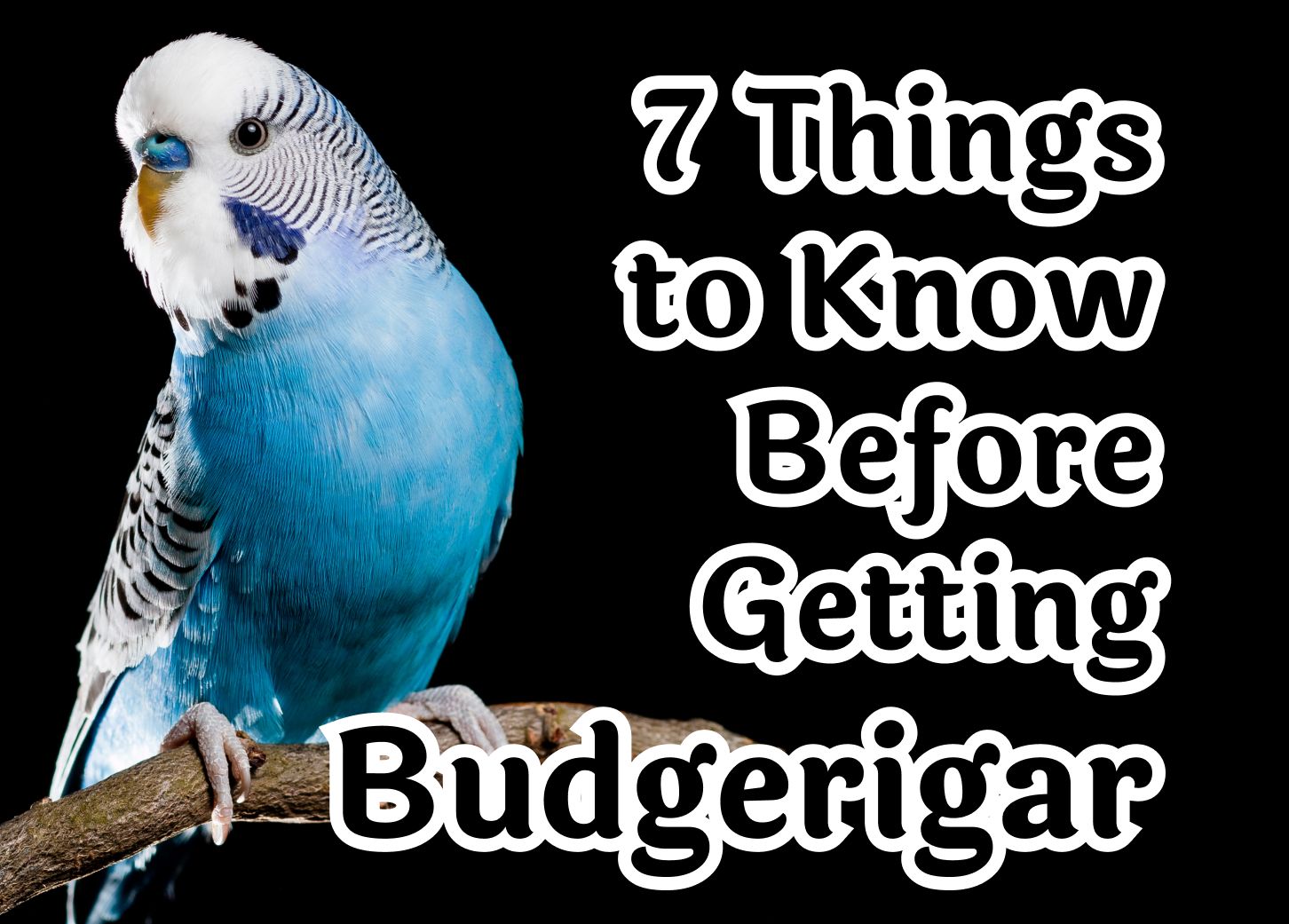What You Should Know Before Getting a Budgerigar

Budgerigars are the third most popular pet after dogs and cats, and for good reason! These birds are small and inexpensive, have the ability to mimic human speech, and can make great companions.
Budgies are one of the smallest parrots, ranging from 5 to 11 inches long with a wingspan of 10 to 14 inches and weighing 30 to 40 grams. These birds can come in lots of different colors, including green, yellow, blue, violet, white, and pied, and they typically have black bars on their wings, back, and head. The most common color is the bright green and yellow color found in wild budgies in their native Australia.
There are two types of budgerigars: the traditional Australian budgie and the English budgie. Traditional budgies are more common, while English budgies are bred for show and the pet trade, making them rarer and more expensive. English budgies are usually about 1 to 2 inches longer with fluffier plumage on the head. They also have a shorter lifespan of around 7 to 9 years compared to the traditional budgie, which tend to live for 10 to 15 years on average.
Have you been thinking about getting a budgie but weren’t sure if it was the right pet for you? If so, keep reading for 7 things to know before getting a budgerigar!
1. Budgerigars are relatively inexpensive compared to larger parrots.
Budgerigars themselves are quite affordable, usually costing between $10 and $35 for a traditional budgie. Most of the expenses for a healthy budgie are up-front when you first buy them, including a cage, perches, food, and toys. You can expect to spend roughly $300 in your first year of owning a budgie. After the first year, the main costs are associated with maintaining their cage, food, and routine vet visits. Since budgies are so small, they tend to be much less expensive than owning a larger parrot since they do not need as much space or food.
As with all animals, you should be prepared to take care of them for their entire lives in terms of both finances and time. Budgies should be fed a balanced diet to prevent potential health problems. They should also be taken to the vet for annual check-ups to ensure that they are healthy, and they should be regularly screened for parasites.
2. Budgerigars require large cages with adequate enrichment.
Like all birds, budgerigars should be provided enough room in their enclosure to move around and spread their wings. Their cages should be 18.5 x 18.5 x 18.5 inches minimum, however, if you have space for a larger cage, this will allow more room for horizontal flight. Ideally, a budgie’s cage should have horizontal bars that are spaced less than half an inch apart so that they can grip and climb without the risk of getting stuck or hurting themselves. There should also be enough room to comfortably fit a nest, some toys, food and water bowls, and perches.
Perches of different shapes, sizes, and textures placed at different heights should be provided to give the budgie options and to keep its feet in good shape. In their natural habitat, budgies live in tree holes or crevices, however, they tend to do well in captivity with a nest or box filled with soft material to sleep in.
An assortment of different toys can keep a budgie entertained and mentally stimulated when its owners are unavailable, such as rope ladders and swing toys. Toys should be alternated each week to prevent boredom. It is important that the toys you give your budgie are zinc-free, as zinc is toxic to birds, and that they do not contain any small parts that could break off and become a choking hazard. Other enrichment tools you can provide your budgie include a mirror to make them feel as though another bird is present and a bird bath to provide mental stimulation and keep their feathers healthy.
Budgerigars’ cages should be cleaned regularly. A liner or bedding at the bottom of the cage should be replaced each day, as should their water. Food and water bowls should not be placed directly under their perches, since budgies produce droppings all day long. Dishes, toys, and perches should be cleaned regularly with hot soapy water or replaced if they cannot be washed. Budgies also have a tendency to toss their food around their cage, as well as outside of their cage, so you may need to regularly vacuum around their enclosure.
3. Budgerigars are sociable and can make wonderful companions.
Budgerigars are usually friendly and sociable birds once they build a bond with their owners. They are quite easy to tame, especially when they are acquired as juvenile birds. When they are first brought home, budgies may take some time to get used to their owners. Once a budgie has become accustomed to its enclosure, you can put your finger next to them each day without touching them until they decide to hop on your finger. It is best to move at their pace and to always be gentle. Sudden movements and grabbing can scare them and break down the trust you have gradually been building; for this reason, budgies may not do well with small children, and parents must train their children to handle them with care.
These birds are highly sociable in the wild, so it is very important to ensure they have company to keep them happy. Their cages should be placed in a room that the family spends plenty of time in, and owners should regularly interact with their budgie. Placing a mirror in their cage can also provide comfort to these birds because their reflection can make them feel as though another bird is present. Buying budgies in a pair can provide good company for both birds, however, paired birds do not tend to bond as well with their owners as birds housed alone, and they may not mimic human speech as much, if at all.
4. Budgerigars have the ability to whistle tunes and mimic their owners.
Like most parrots, budgerigars can learn words and melodies, which is part of what makes them so popular. Whether a budgie will speak and how often it will do so depends on the individual budgie, however, with some budgies never talking or singing. As we discussed in the previous point, paired birds are less likely to make an effort to mimic their owners than birds kept by themselves. You can encourage budgies to speak or sing by talking, singing, or whistling around them and by playing music for them.
Budgies have the potential to develop a large vocabulary containing hundreds of words. Male budgies tend to be better at singing and mimicking their humans, especially when kept alone. Females, on the other hand, rarely learn more than a dozen words.
5. Budgerigars must be let out of their cage each day to fly.
Budgerigars require a great amount of exercise, like all birds, as well as sufficient mental stimulation. For this reason, budgies should be allowed out of their cage for at least 2 hours each day. They should be confined to a single room and supervised to keep them safe. Unrestricted access to the home can result in them encountering dangers such as small children, other pets, hot stovetops or appliances, deep water in sinks or other containers, and household toxins.
Allowing budgies out of their cages once a day can help prevent obesity in these birds, which can lead to a number of health problems, as well as allow for socialization and mental stimulation. Having free range of a room with their owners can assist in building the bond between budgie and owner, and it can prevent boredom associated with being kept in a cage all day.
6. Budgerigars should be fed a balanced diet to keep them happy and healthy.
Budgerigars require a healthy diet to prevent issues such as obesity and malnutrition. A balanced diet for a budgie includes 75% nutritionally balanced pellets, 20% to 25% fresh fruits and vegetables, and 5% or less seeds and treats. Cuttlebones can be provided in their cage as a source of calcium. Foods such as avocado, chocolate, sugar, and salt can be toxic to birds in miniscule amounts, so they should be avoided.
Don’t let your budgie’s love of seeds fool you—feeding too many seeds can lead to a variety of health problems due to their high fat content and can result in your bird refusing to eat other foods. If seed-based diets are fed, these birds may pick out their favorite seeds and leave the rest. If your budgie is addicted to seeds and refuses to eat their pellets or fresh foods, you can try introducing sprouted seeds, which tend to be more easily accepted than other foods and are healthier than seeds. When introducing new foods, it is important to do this gradually over 7 to 10 days to prevent gastrointestinal upset.
7. Budgerigars are at risk of certain health conditions if they are not cared for properly.
Budgerigars can develop many different health problems, and their lifespan in captivity is heavily impacted by their diet and exercise levels. The most common diseases seen in budgies are related to seed-only diets and obesity. Obesity can directly lead to diseases such as arthritis and hepatic lipidosis, or fatty liver disease, as well as benign growths including lipomas and xanthomas, which can limit mobility. Malnutrition can also occur from seed-based diets, causing deficiencies in vitamin A, vitamin D, and calcium. Vitamin D and calcium deficiencies can cause egg binding, even if a female budgie is not kept with any other birds, which can be life-threatening. Lastly, seed diets can result in an underactive thyroid gland and subsequent goiter because of the low levels of iodine in these diets.
Other common diseases in budgies include internal and external parasites, infection, and cancerous growths. For example, psittacosis or chlamydiosis is a common bacterial respiratory disease found in areas where many birds are in close contact, such as pet stores, so it is important to ensure you buy your budgie from a seller who practices good hygiene and does not house too many birds in the same enclosure. Budgies can also develop tumors in the kidneys or reproductive organs, which can cause leg lameness that can be confused for a leg injury.
Budgies can sometimes have overgrown beaks and nails as well. Your veterinarian can show you how to clip their nails at home if they are not being worn down by their perches. In cases of the upper and lower beak not meeting properly, a budgie may need regular vet visits to trim their beak.
Like all prey animals, budgies are good at hiding illnesses, so owners should look out for signs of lethargy, excessive vocalization, ocular or nasal discharge, fluffed up feathers, feather loss, changes in eating or drinking, and diarrhea.
There you have it—7 things to know before getting a budgerigar. Budgies can be wonderful companions, and they can be a good addition to the family in households equipped to care for them.
References
Avian and Exotic Animal Care. “Budgerigar.” Available at: https://avianandexotic.com/care-sheets/birds/budgerigar/
AZ Animals. “Budgerigar: Melopsittacus undulatus.” Updated February 18, 2021. Available at: https://a-z-animals.com/animals/budgerigar/
Beauty of Birds. “Budgerigars/budgies – common diseases.” Available at: https://www.beautyofbirds.com/budgiediseases.html
Budgie Bliss. “11 tips for ultimate budgie care (great for beginners!).” April 28, 2019. Available at: https://budgiebliss.com/2019/04/28/11-tips-for-ultimate-budgie-care-great-for-beginners/
Hess L, Axelson R. VCA Hospitals. “Common conditions of pet birds.” Available at: https://vcahospitals.com/know-your-pet/common-conditions-of-birds
HugglePets. “Budgie care sheet.” Available at: https://www.hugglepets.co.uk/pet-advice/budgie-care-sheet/
Kalhagen A. The Spruce Pets. “A guide to pet budgie birds.” Updated January 3, 2020. Available at: https://www.thesprucepets.com/facts-about-budgies-390923
Kalhagen A. The Spruce Pets. “The cost of purchasing and caring for a pet bird.” Updated March 8, 2021. Available at: https://www.thesprucepets.com/pet-bird-price-list-390212
Petopedia. “All about budgerigars.” Available at: https://petopedia.petscorner.co.uk/budgies/



